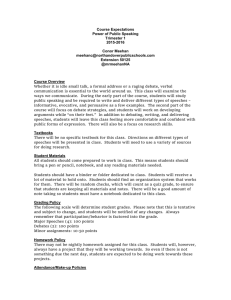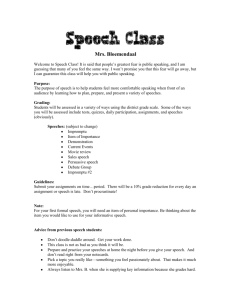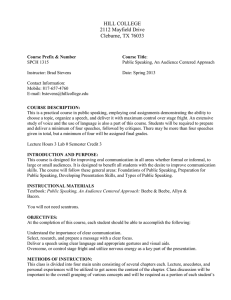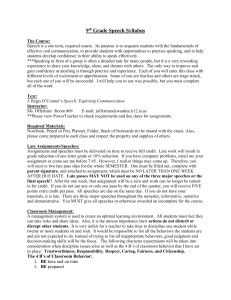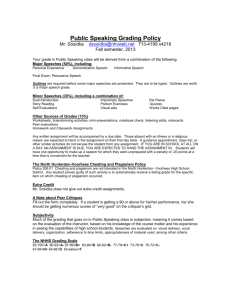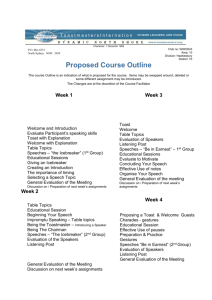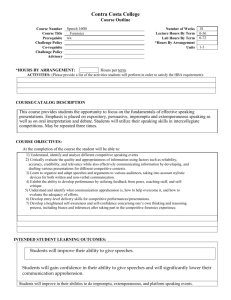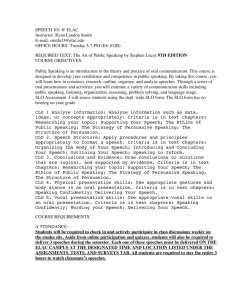Principles of Speech and Communication
advertisement
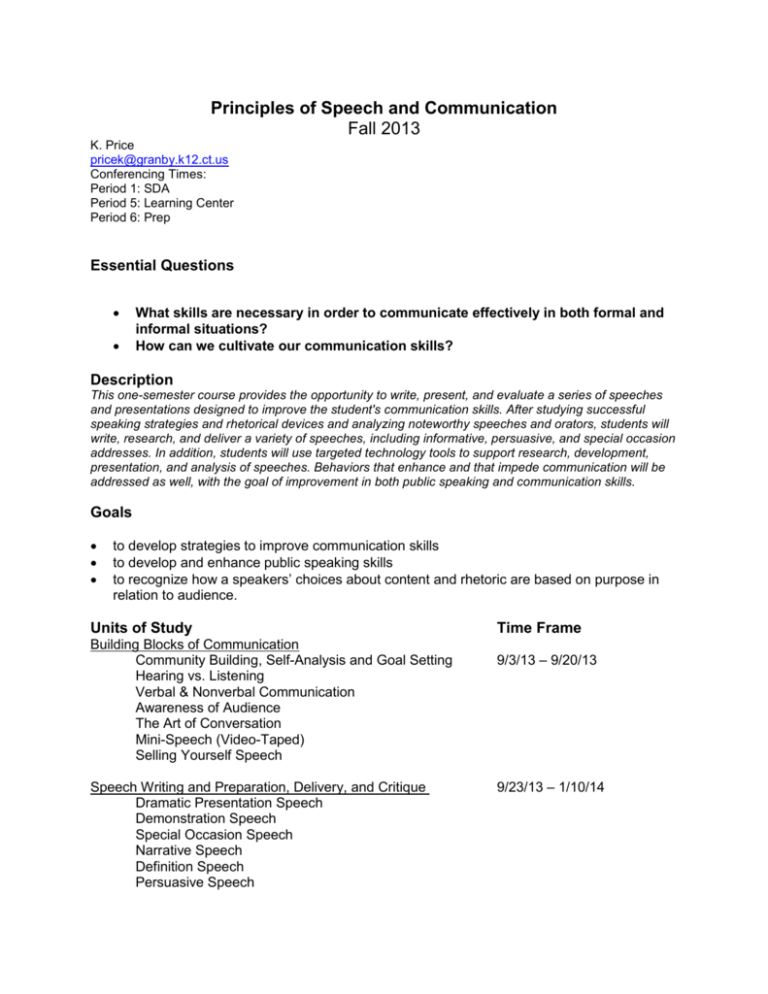
Principles of Speech and Communication Fall 2013 K. Price pricek@granby.k12.ct.us Conferencing Times: Period 1: SDA Period 5: Learning Center Period 6: Prep Essential Questions What skills are necessary in order to communicate effectively in both formal and informal situations? How can we cultivate our communication skills? Description This one-semester course provides the opportunity to write, present, and evaluate a series of speeches and presentations designed to improve the student's communication skills. After studying successful speaking strategies and rhetorical devices and analyzing noteworthy speeches and orators, students will write, research, and deliver a variety of speeches, including informative, persuasive, and special occasion addresses. In addition, students will use targeted technology tools to support research, development, presentation, and analysis of speeches. Behaviors that enhance and that impede communication will be addressed as well, with the goal of improvement in both public speaking and communication skills. Goals to develop strategies to improve communication skills to develop and enhance public speaking skills to recognize how a speakers’ choices about content and rhetoric are based on purpose in relation to audience. Units of Study Building Blocks of Communication Community Building, Self-Analysis and Goal Setting Hearing vs. Listening Verbal & Nonverbal Communication Awareness of Audience The Art of Conversation Mini-Speech (Video-Taped) Selling Yourself Speech Speech Writing and Preparation, Delivery, and Critique Dramatic Presentation Speech Demonstration Speech Special Occasion Speech Narrative Speech Definition Speech Persuasive Speech Time Frame 9/3/13 – 9/20/13 9/23/13 – 1/10/14 1/13/14 – 1/24/14 Final Revision & Rehearsal Formal Speech Final Critique & Reflection Resources O'Hair, Dan, Hannah Rubenstein, and Rob Stewart. A Pocket Guide to Public Speaking. Boston: Bedford/St. Martin's. 2004. Various Internet resources, selected by instructor and students Student-created presentations Student-generated speeches Grading Your grade will be based on a points system. You will be aware of point values for each assignment. At the end of the quarter, your grade will be the number of points you earned divided by the number of possible points for the quarter. I will use a variety of formative and summative assessments to gage your understanding and see evidence of your growth & learning. You can expect timely and thorough feedback on your work, and I make a concerted effort to update the portal on a weekly basis. Please understand that I value many of the intangible attributes that students bring to the classroom to foster a sense of community, and as much as I am able, I will reward your positive contributions to this class. Assignment/Homework Policies & Expectations Please come to class prepared to participate actively. Be willing to take positive risks. Assignment types include speech drafts, critiques (self and speaker), reflections, quizzes, formal speeches (preparation, presentation, delivery) and participation Assignments that are turned in late will not receive full credit, and late assignments will be graded at my convenience. Being unprepared on a pre-planned speech day will result in a 50% reduction. Do not e-mail work unless specifically asked to do so. Pet peeve alert: Do not ask for a pass to print an assignment at the beginning of class. As a rule, assignments should be typed, double-spaced, size 12 font. All speeches and major assignments will be submitted to turnitin.com. Log in information will be provided ahead of time. Also, please remember that your assignments are due on the date assigned even when you are dismissed early for sports events, class or club involvements, personal appointments, or field trips. It is your responsibility to deliver your assignment before your dismissal. If you miss class due to a legitimate absence, it is your responsibility to see me before or after class for assignments, not during class time. Always check the board and website for assignments. English Department Check Values While the point value or percentage weight of individual assignments may vary according to the type of assignment given, your daily homework and classwork may be assessed according to the following criteria: + / 95%: Assignment reflects precise attention to instructions; the question being asked or writing topic is completely and accurately addressed. Main points are fully developed with supporting details, using direct quotes from the text where appropriate. Assignment displays a minimum of errors in grammar, spelling, and punctuation. Additionally, word choice and sentence variety reflect the writer’s careful attention. Assignment includes student’s name, date, and title of assignment. Work is prepared carefully and neatly, reflecting the student’s best efforts. / 83%: Assignment basics are completed, though student work may not follow all of the instructions. Main points are partially supported with details, but not to the extent of a + answer. Assignment may contain several grammar, spelling, and punctuation errors, and may not be written in complete sentences. Assignment may be missing date or title. Assignment appears to be hastily prepared as compared to + work and does not reflect the student’s best efforts. - / 69%: Assignment is not complete and/or only partially follows the instructions. The response minimally addresses the question being asked. Work is short, general, and/or superficial. Answers are generally not in complete sentences, and there are many grammar, spelling, and/or punctuation errors. Assignment may be missing date and title. Written work may be messy or illegible and does not reflect much effort. - - /55% or lower: Assignment is attempted but less than half done. Assignment absolutely does not represent what student is capable of producing with more time and effort. In addition to these grades, student work may earn these grades: / + (89%); / - (78%); Truly extraordinary work may earn a + + (100%).

